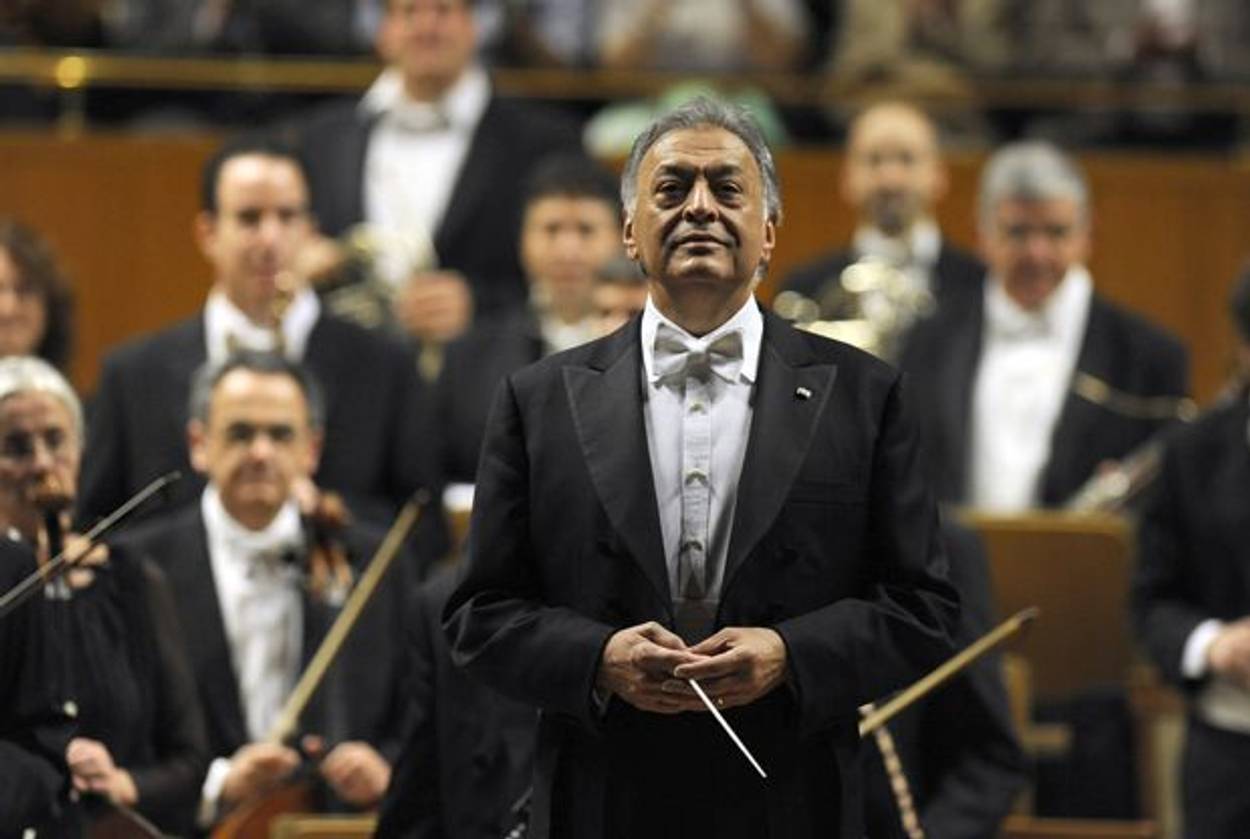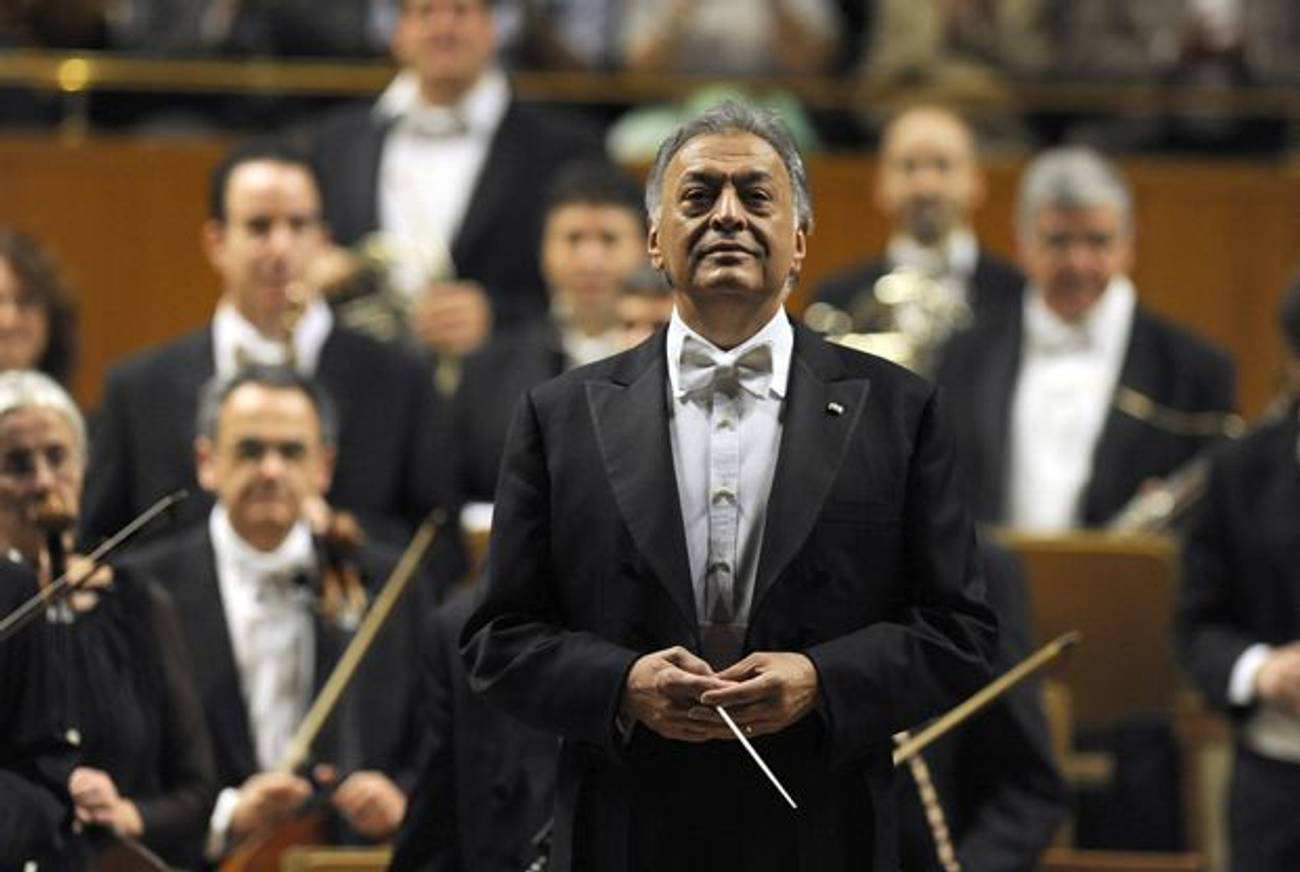Zubin Mehta Speaks Out
The maestro slams artistic boycotts and Israel’s Palestinian stance as his Philharmonic visits Carnegie Hall




Last Thursday night, Zubin Mehta was not happy. Carnegie Hall’s Maestro Room was being renovated and had been reduced to the size of a walk-in closet. There were no chairs for guests. The hanger for his garment bag was permanently affixed to the flimsy metal coat rack above the piano. “Did they think I would steal the hanger?” he said, glancing around the room. “It looks like a motel,” he added, the unspoken adjective “cheap” hung limply in the air.
“Shall we begin?”
The conductor was clearly displeased, and not only by his shabby temporary headquarters. He was unhappy about, but not surprised by news that Adalah-NY was staging yet another protest of the Israel Philharmonic Orchestra’s concert on Thursday night. Pulitzer Prize-winning author Alice Walker and Pink Floyd’s Roger Waters were among 50 artists and writers who signed a letter demanding that Carnegie Hall cancel the orchestra’s appearance in response to the Palestinians’ call for a cultural boycott of the Israeli “apartheid state” that is occupying Arab land, building settlements, and repressing Palestinians.
The IPO, Mehta admitted, was less welcome in many parts of the world these days because of such policies. “As long as they keep building settlements the world will be anti-Israeli,” he said.
Is such criticism fair? “Most of it is unfair. Part of it is fair,” he replied. Mehta opposes not only the settlements, but, he said, “the bombardments, by both sides! We’re firing into Gaza! They’re firing into Israel. Why? They’re not bombing the settlements! When is this going to stop?” He added, “We see photos of militants mourning, and the pictures break your heart. And there are millions of such mourners.”
Might the impending Israeli election change such policies? “We already know the results!” Mehta said. “Bibi is not a dictator. But he’ll win like one. Dictators win for sure.” The policies advocated by Prime Minister Benjamin Netanyahu’s newly formed coalition partner, Israeli Foreign Minister Avigdor Lieberman, are “isolating Israel from the world.”
***
Zubin Mehta has strong opinions about politics, music, and his beloved orchestra, the Israel Philharmonic, which he has advised since 1969, directed since 1977, and led as “musical director for life” since 1981. He is a public-relations executive’s nightmare—a musician who wears his passions on his sleeve, or in this case, his baton.
Mehta, born in 1936 to a musical Parsi family in Bombay, is not Jewish. Nor does he speak Hebrew, despite having spent at least three months of most years in Israel since 1961, when he first directed the IPO. But he is passionately committed to Israel and his orchestra—and, one must add, irresistibly charming and articulate. He has a deep appreciation of Israel’s complexity and its impact on global culture.
Israel’s more than 7 million people, he says, are more deeply polarized than ever before, but in new ways. “There’s no more left and right,” he says. The traditional political dividing line has all but disappeared in Israel, as it has in America. But now there’s “black and white, religious and non-religious, rich and poor”—so many cleavages.
The orchestra, however, brings people together. Which is why, he argues, trying to isolate Israel by targeting the IPO is both misguided—since the orchestra is a private foundation and not a state agency per se—and counter-productive. Music unifies people.
But not even his orchestra is immune from the pressures generated by Israel’s burgeoning ultra-Orthodox population—the “half of the country that has eight children per family,” as he referred to them. A source close to the orchestra said that Mehta had to find a replacement cantor to sing in the Thursday concert’s featured composition—the New York premiere of Israeli composer Noam Sheriff’s “Mechaye Hametim,” (“Revival of the Dead”)—after an ultra-Orthodox tenor refused to perform when he learned that women would be singing in the choir on stage. On other occasions, the source said, Mr. Mehta has had to warn at least two other orchestra members who objected on religious grounds to women singing that he would not tolerate such bias.
Mehta has been active in promoting music education for Israeli-Arabs, who now constitute roughly 20 percent of Israel’s population. In cooperation with Bank Leumi and the Arab-Israel Bank, he founded in 2009 a music education program for Israeli Arabs called “Mifneh” (Change). He continues giving free concerts in predominantly Israeli-Arab towns like Acre—though fewer of them today due to financial pressures on the orchestra—and hopes to have at least one Arab-Israeli in his orchestra soon. There are seven or eight Arab-Israeli students in Mifneh who might soon be able to audition for the orchestra, he says. Musicians audition behind a curtain to prevent bias. “No one gets in based on religion, race, or color,” Mehta told me.
Mehta’s modesty about his own success and talent is unusual in conductors, who tend to have an obsessive, dictatorial streak. “Orchestras are not democracies,” said Martin Mayer, a former music critic for Esquire and Opera magazines and the author of a book on the Metropolitan Opera’s centennial. “Conductors are the original maximum leaders.” Mayer called Mehta an “excellent” conductor, though not for everything. “He’s not particularly strong on Beethoven and the orchestral staples of the early 19th century,” he said. “But he’s very good on early 20th-century music—like Schoenberg.” So, Thursday’s concert was playing to his strengths.
Mayer called Mehta “technically highly regarded.” As for the IPO, “it’s always been a good, but not a great orchestra.” It’s difficult, he added, “to have a great orchestra in such a small country. But the Israelis have always put a lot of time and money into it.”
What Israelis value, Mayer added, is Mehta’s loyalty to the orchestra and the state itself. In times of war and crisis, he has often canceled other commitments to perform with the IPO. During the ’67 war, he left a Met tour to catch the last plane to Israel before the Tel Aviv airport closed. And in the 1991 Gulf War, he conducted performances during scud missile attacks. “Israelis remember such things,” Mayer said. Such devotion has earned him the right to criticize the state and orchestra he has adopted. And criticize he does.
“I wish that only three residents of Tel Aviv could see what conditions on the West Bank are like,” Mehta told me. “Living in such proximity, most Israelis have no idea about the adversity on the West Bank.” He goes to Ramallah to look in on the music program sponsored by his friend Daniel Barenboim. “So, I see the conditions. Israel gives the West Bank water twice a week! One way of promoting good would be not to ration water.”
Most Israelis are unaware of these conditions, he added. “They don’t know. But many don’t want to know.”
Yet Israeli culture, said Mehta, has come into its own—despite the IPO’s continued unwillingness to perform Richard Wagner—with new chamber music and folklore groups, ballet companies, and theater groups bringing Israeli culture to the world, and the work of Israeli and Jewish artists into the global mainstream.
Thursday’s concert at Carnegie Hall was a prime example, he said, a “milestone” in which all three pieces were written by composers of Jewish extraction—Arnold Schoenberg’s Kol Nidre; Felix Mendelssohn’s Piano Concerto No. 1 in G minor, Op. 25; and the showcase of the program, “Revival of the Dead,” by Noam Sheriff.
Born in Tel Aviv in 1935, Sheriff is one of Israel’s best-known, most versatile composers. Commissioned by a wealthy Dutch fashion designer who survived the Holocaust and wanted to pay tribute to the Jews who perished, the symphony has four movements that offer a narrative of Jewish history—Jewish life before the Diaspora until the Holocaust, the genocide itself, the Kaddish and Yizkor, and revival and renaissance in Israel. Sheriff said he wrote the symphony while teaching in Cologne, Germany. His wife, Ella Milch-Sheriff, who is also a composer, described her husband to me as “annoyingly terribly talented.”
Noam Sheriff was thrilled, he told me over breakfast with Ella at Balthazar’s in downtown New York, when Mehta told him that he would perform the piece this year at the Salzburg Music Festival, Europe’s and perhaps the world’s most prestigious musical venue. “Never, in my wildest dreams,” he said, “did I think it would be performed in Salzburg.” Sheriff describes Mehta as “sensitive, intelligent, and modest. There’s no big ego. Working with him is a joy.”
And despite the threats of boycotts and disruptions, Thursday night’s sold-out performance at Carnegie Hall went off without a hitch. Across the street, 60 protesters were clamoring against the presence of the IPO in New York in light of the conditions that Mehta described and complained about.
Would he have joined them if he weren’t conducting? I asked him. “No!” he replied. That’s neither his style nor his way. “I believe in music.”
Judith Miller, Tablet Magazine’s theater critic, is a former New York Times Cairo bureau chief and investigative reporter. She is also the author of the memoir The Story: A Reporter’s Journey.